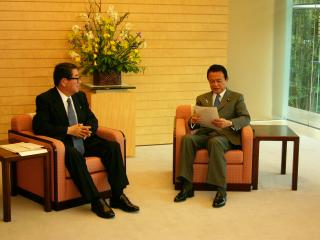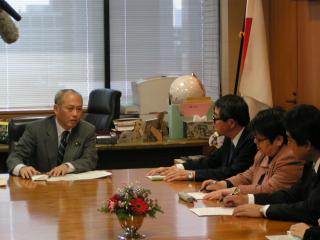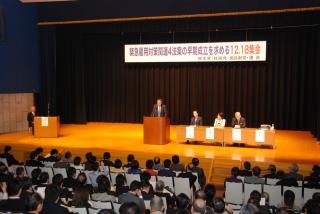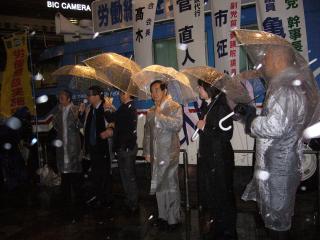Updates
RENGO’s actions against the deteriorating employment situation throughout December 2008.
 |
| President TAKAGI met with Prime Minister ASO (right) |
 |
| President TAKAGI met with Minister of Health, Labor and Welfare, MASUZOE (left) |
 |
| A joint rally in Tokyo on 18 Dec. |
 |
| President TAKAGI made a street speech in Tokyo on 22 Dec. |
In response to the deteriorating employment situation in Japan, RENGO took urgent actions throughout December 2008. A variety of actions were held, which kicked off with a rally on 1 December in Tokyo. At the kick-off rally, RENGO President TAKAGI said: ‘We won’t make the Japanese employment situation any worse. During this month, we will do all we can.’ Representatives from the Democratic Party of Japan (DPJ), Social Democratic Party (SDP), and the People's New Party (PNP) expressed their support for RENGO, criticizing that the Aso Administration was too insensitive to the current financial crisis. Subsequently, a local RENGO officer in Shizuoka and a member of JAM union on behalf of 52 industrial federations (affiliates) reported their working environments and situations respectively.
On 4 December, RENGO President TAKAGI, Acting President OKABE, and General Secretary KOGA met with Prime Minister ASO to have a Government-Labor meeting at the Prime Minister’s Office. RENGO President Takagi demanded for immediate employment measures to tackle vulnerable workers and to strengthen social safety nets. In response, Prime Minister ASO stressed that the Japanese government has strengthened measures especially for people, regional areas, and small-and-medium-sized enterprises, after showing his understanding of the extremely severe economic condition and people’s growing anxieties.
On 9 December, RENGO General Secretary KOGA visited the Association of Prefectural Governors to ask to take employment measures for non-regular workers who are in jobless and non-housings to provide better vocational training programs and job opportunities, and so on at a prefectural level. In response, the Association of Prefectural Governors said: ‘We will inform every prefecture of RENGO’s request. We also want to make the utmost effort to improve employment and living conditions, though financial difficulties’.
On 9 and 10 December, RENGO ran 2-day phone counseling mainly for students canceled their job offers. RENGO received 74 calls, including 21 calls regarding cancellation of job offers. Meanwhile, on 11 and 12 December, all 47 local RENGOs ran 2-day phone counseling on layoff problems focused on non-regular contract workers. A total of 848 workers across Japan called in. The largest number of calls was on sudden rescission of contract before termination.
On 12 December, RENGO President TAKAGI met with Minister of Health, Labor and Welfare, MASUZOE. President TAKAGI called for six points, including (1) Opposition against abolishing or reducing the government’s burden on unemployment insurance premiums (2) Immediate implementation on loan system for workers who lost job and housing (3) Immediate expanding applicable range of the government subsidies for unemployment adjustment to non-regular workers. In response, Minister MASUZOE replied: (1) Agree with RENGO’s opinion (2) Developed the system for those who available want to
On 18 December, a rally took place, co-organized by RENGO, the Democratic Party of Japan (DPJ), the Social Democratic Party (SDP), and the People's New Party (PNP). Nearly 600 members from unions and the Diet attended the rally, claiming that the Diet should promptly pass four emergency employment bills which the DPJ, SDP, and PNP had jointly submitted in the Upper House.
On the same day after the rally, RENGO General Secretary KOGA visited Nippon Keidanren (Japan Business Federation), JCCI (the Japan Chamber of Commerce and Industry), and the Japan Association of City Mayors, calling for urgent actions for better employment and living conditions. On the following, he visited National Federation of Small Business Associations as well.
As for political actions, RENGO visited major political parties, urging to take immediate measures for workers.
¡¦18 December: the Democratic Party of Japan (DPJ) and the People's New Party (PNP)
¡¦19 December: the Liberal Democratic Party (LDP), Komeito and the Social Democratic Party (SDP)
On 19 December, RENGO organized a symposium entitled “Overcome the Barrier between Regular and Non-Regular Workers--How do we tackle the employment crisis--” in Tokyo. Nearly 250 union members participated.
On 22 December, RENGO and all local RENGOs took actions on the street throughout the country in conjunction with political parties, appealing for regime change.
In advance of the above actions, RENGO conducted a nationwide survey on the current employment situations in November. All 47 local RENGOs and a total of 1363 enterprised-based unions answered. The survey of local RENGOs shows that employment adjustment has been expanding even regular workers. Meanwhile, the survey of enterprised-based unions shows that one of three companies had already implemented employment adjustment especially in manufacturing industry, which will expand in other industries in some way.
On 26 December, RENGO will conduct a phone counseling service during the end of 2008 year and the begging of the 2009 (from Dec 31. to Jan 4). Rengo’s members will give some advices on the deteriorating employment conditions for the working people and families at 9:30 A.M to 6:00 P.M during the above period.